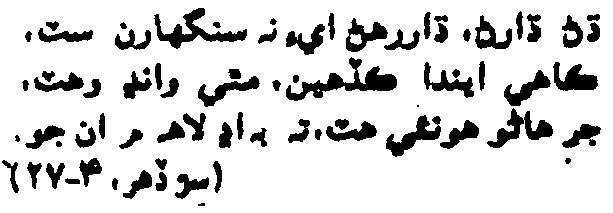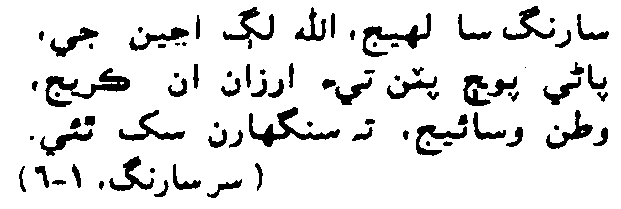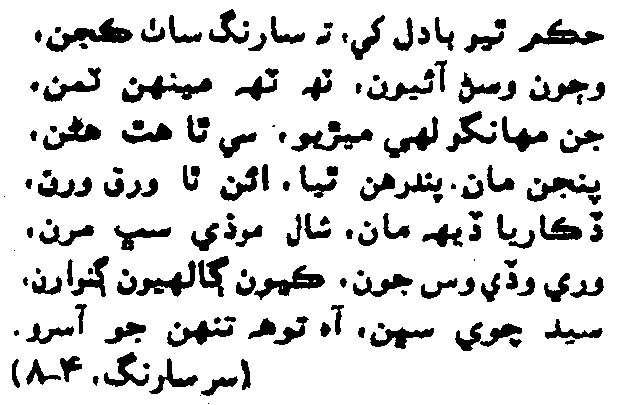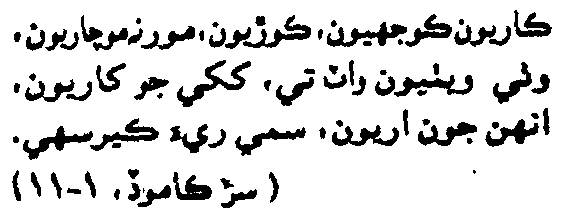
Earlier in chanter two I have already given an account of some of the political ideas of Shah Latif as well. In this connection it has also been especially discussed what were the conditions prevailing during his time and what had been their influence on Shah Latif.
It has not been possible to discover the detailed historical conditions of the times of Shah Latif. But whatever material in this connection has been available, after looking closely at it, analyzing deeply the poetical work of Shah Latif and taking the political conditions of this period into account, the conclusions I have reached on the basis of convincing arguments, I would like to present them in this chapter.
It is quite possible that some of the readers of this history or some men of learning who analyze history with a traditional view point may not agree to the conclusion I have reached. But the arguments and evidence on the basis of which I have come to these conclusions, are so strong and convincing, that unless and until my conclusions are refuted and proved otherwise through stronger and more convincing arguments, I would consider myself justified in holding my view based on incontrovertible truth.
Every one is aware of the fact that it is usually only a few doctors who agree about the diagnosis of a patient It is therefore quite possible that some of the people may find it difficult to agree with me. However, the truth is that the political ideas of that time did not come into the knowledge of people with evident fundamental principles, as it is possible today. It was the period of autocratic rule in Sindh. Education was limited to a few people. People were not familiar with the Western culture and civilization; there existed no conception of assemblies, ministries and elections, of getting votes on the basis of programs and formation of political patties on the basis of principles. In the country the political term like socialism, nationalism, Pan-Islamism, communism, capitalism and fascism did not exist. The system of government, which was prevalent in Sindh at this time, was in accordance with the feudal system and religious slogans. Therefore it would be inappropriate to see any resemblance between this system with the political system which exists today. But at the same time it would not be an exaggeration to say that although the above mentioned ideas were not prevalent in their present form, the germs of these ideas were definitely present in those days. During this period if there is an evidence of the existence of feudal lords and the tenants serving in their fields, it is a proof of the presence of the material, which ultimately brings about the evolution of socialism.
If in Sindh there are instances of the Sindhis putting up resistance against the foreign invasions, plundering and wielding power over them and struggling for their independence, then any effort to deny the existence of the spirit and movement for the establishment of socialistic system in Sindh is futile and useless. The battle which the Samba and Soomro rulers fought against the foreign invaders, and the Sindhi poets applauding and eulogizing them, is a clear reflection of the spirit of nationalism which existed at that time.
In the movements of Syed Miran Muhammad Jaunpuri and other Muslim leaders there are clear and evident indications of Pan-Islamism. The support extended by Qazi Kazan to his religious guide Bhai Shah Baig Arghoon is the practical evidence of this thought and spirit.
It is true that no organized form of capitalism existed here, but even today it does not exist in Sindh in the form as it is found in the West. The basic quality of fascism is that a few individuals deprive the people of their freedom, simply for their personal or class interest. Through the use of power they try to influence every department of the people’s life, and through suppressive and coercive measures try to mould the country according to their point of view. If in the light of these characteristics we analyze the past, we shall find a clear evidence of the presence of fascism during the reign of the Kalhoras.
To implement the religious dictums of Makhdoom Muhammad Hashim Thattvt by the government, to have such venerable religious guides as Mian Abdur Rehman and Shah Inayat Sufi martyred, are the clear indications of the influence of fascism. Moreover imposing such restriction upon the Muslims to keep a beard of a specific shape, to wear the trousers in accordance with Muslim religious law and to impose instructions upon the religious customs of Hindus, were the kind of’ practices which clearly indicate the reflection of fascist tendencies.
The theory of communism did not exist in its present form at that time, but the elements promoting such tendencies were present. Just as there is an element of fire always present in the wood and ma3i~ itself appear when there are causes of its burning and flaring up, in the same manner the existence of naked, hungry, homeless, oppressed and helpless people is an evidence, that there existed a serious need even at that time of a people’s revolution as a consequence of the events resultant from the class system.
In the light of the facts stated above I would be perfectly justified in forming the opinion about the political tendencies of Shah Latif with the help of his poetry that he was a great advocate of:
1. Advocacy of Nationalism
There are two specific conditions for nationalism: Conception of a country from the geographical and lingual point of view and nationalism on the basis of a homeland.
Because I have already written in detail in the fourth and fifth chapters about Shah Latif's ideas about Sindh and his conception of nationalism, therefore it is not necessary to repeat the same facts and arguments. Those who entertain any doubts about it they should generally study the entire poetical work of Shah Latif and especially Sur Marvi. Their doubts will be removed quite easily.
2. Advocacy of Democracy
There is no denying the fact that Shah Latif was the standard bearer of the support to the common man and the unity of the oppressed and the impoverished. He felt deeply grieved at the lack of courage and disunity among the people. Thus giving them the example of birds he says:

At one place addressing by one of the famous titles given to the people of Sindh he tries to arouse a consciousness among them, and says that it is not the custom of the patriotic people to direct the entire attention toward achieving selfish interests, abandoning the spirit for the betterment of the nation:

Not only was there lack of unity between the common man and the wealthy class due to the miserable life of the people of Sindh, the terrorist activities of the feudal lords, the prejudices of the priests and the selfish attitude of the religious guides, but there was also a state of absolute disintegration of the nation. Expressing his sense of grief over this situation he says:

Shah Latif says:

In the folk tale of Rai Diach and Bejal in Sur Suratth he has emphasized the truth, how the public opinion can force even the kings to bow before it:


Addressing the patriotic elements who seek seclusion or leave the country after being disheartened by unfavorable situation, he says:

All these allusions in his poetry are a clear evidence of his love of democracy.
3. Shah Latif’s inclination toward socialism
Shah Latif entirely advocated the cause of the poor and wanted to see the oppressed people united. Many instances in this connection have already been quoted earlier in this book. Here by giving further example of his love of socialistic tendencies, I would make an effort to explain, that although Shah Latif used to pray generally for a revolution for the independence and prosperity of the homeland, but his main objective had always been to see the poor people prosperous and happy. In very clear manner he appeals to Sarang (symbolizing revolution) that he should direct his attention toward the care of the hungry and the thirsty. Let there be food in abundance so that people are prosperous:


The fact is quite evident that the greatest desire of Shah Latif was to see the land prosperous and people living a comfortable life, and considered together, the interest of the people and poor farmers. He believed that the revolution in the society, which comes through the national independence, it is essential that poor class of the farmers should reap its benefits. He was firmly opposed to the hoarders, profiteers and relentless and chief landlords, and wanted to see them destroyed. He believed that the blessing of true economic independence will alleviate and eliminate all their sufferings:

He always prayed for the people of Sindh when he observed their misery and deprivation and wished them also to share the blessings of a prosperous life, and wanted to see them liberated from a nomadic life to live a civilized life:

He has also not overlooked half-starved fishermen, partially clad laborers. So praying for them as well he says:

Shah Latif has projected Jam Tamachi as a symbol of a true people’s leader, in other words he is not arrogant about his position, does not try to prove himself superior to others, and looks like a common man when he is in the midst of the people. He does not attach any importance to gorgeous Samma and Soomro princesses and does not care for any one except for the inhabitants of "Kenjhar". He exhibits a spirit of cordiality with the fishermen who are usually clad in dirty and tattered clothes and their dark skin and unattractive women carrying ill-smelling fish baskets on their heads. He has no place in his heart for the people who rule the country. Rather be prefers to show his love and generosity toward the poor and the miserable people:


4. Pan-Islamism
I have already mentioned in the earlier chapter that there has been a group among Muslims which considers the Muslim possessing the right of superiority over the rest of humanity and leadership of the world, and has the conception of establishing the power of a caliphate in the name of the domination of Islam. According to this conception it is essential to have the faith about (3ihad) holy war, the superiority of the Muslims over others and domination of Islam. If we have faith in these ideas, then the fundamental principles of Islam, peace and security, equality and democracy prove false. But every one having any claim to mysticism has been opposed to this idea. Shah Latif had firm faith in pantheism. Therefore he was never prepared to give any ideas contrary to this faith a place in his heart. Moreover he was fully aware of the fact that for the last many centuries the people who profess faith in these ideas have caused more harm than any good to Islam due to their conduct, and these people, confining Islam to certain restrictions have made its usefulness doubtful. Whereas the ideas which Shah Latif believed in are expressed in the following verse:


5. Opposition to Dictatorship
When there is no individual freedom in society, when the reins of power are in a few hands, who misuse it for their personal and class interest, and impose their ideas, rules and regulations, and orders forcibly upon the people, the government which uses such measures is called fascist or dictatorial. This form of government is totally contrary to the democratic system. Shah Abdul Latif who desired to see the oppressed people united, could never support such a system of government Moreover every Sufi (mystic) deeply believes in and desires individual freedom, that some of the mystics drift toward "anarchism" because of their extremist views. They are opposed to every form of oppression and cruelty, whether it is perpetrated in the name of religion or society. Thus addressing the oppressors and the tyrants Shah Latif says:

When a dictator, drunk with power, loses control of his senses, considering the people no more than worms, spurns at their feelings and sentiments, Shah Latif giving a warning to him describes his condition in the following manner:

6. Opposition to Capitalism
It has been explained above that Shah Latif was inclined toward socialism, it was therefore a natural consequence of his views that he was opposed to any system of government as a result of which his people should lead a life of poverty, hopelessness, hunger, nakedness and be compelled to lead a nomadic life, and the wealthy class should lead a life of ease and luxury. Through the example of Marvi he desired to remind that she was not prepared to accept any personal comforts and benefits out of greed or fear, until and unless her people were given the opportunity to lead a happy life, and despite every tempting offer by a ruler or class of rulers could never feel happy unless her people were. How could she choose to sleep in a comfortable bed when her people made the grass growing on the land their beds. He says:
